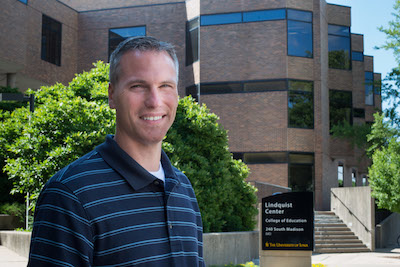The University of Iowa College of Education’s drive to prepare the best teachers doesn’t stop at graduation. Mark McDermott, clinical professor in science education, is helping current educators become better computer science and STEM teachers.

In the summer of 2019, McDermott taught a computer science pilot course to help fill the need for computer science teachers in schools. The course was a collaboration with the Central City Community School District and University of Iowa Computer Science faculty Brandon Myers and Denise Szecsei, and was supported by the Iowa Department of Education’s Computer Science Professional Development Incentive Fund.
“There are lots of schools that want to provide their students quality computer science opportunities, but there aren’t that many teachers who are specifically trained to do that,” says McDermott, who also serves as the college’s STEM coordinator.
With a statewide push for more computer science in schools, McDermott hopes the course will encourage teachers in all disciplines to consider how to use technology in their classrooms.
“Schools are trying to figure out ways to best engage their students and help them develop the appropriate methods for using and understanding technology,” says McDermott.
Additionally, the pilot course will help the College of Education develop future computer science courses for in-service teachers or working professionals who want to learn more about computer science.
The College of Education is also helping to fulfill the national demand for STEM-trained educators with an online Master of Science in STEM Education.
The completely online program is built to help in-service teachers who have an interest in STEM education and are ready to learn more.
“We’re hoping these courses give teachers the opportunity to think about STEM not as a category, but to instead purposefully bring these disciplines together in an integrated way to make the learning environment better for kids,” says McDermott.
McDermott wants the program to help teachers take the ideas they are learning and implement them in their own classrooms.
“Through the readings and discussions they do, it keeps giving them new ideas,” says McDermott. “It gives teachers a new network and repertoire of ideas of how to use STEM effectively in the classroom.”
McDermott says the online STEM program can also help build better educators at the College of Education.
“I also hope that we in the College of Education get connected with these groups of people who have gone through our program and are doing really cool things in their classroom all over the country, “says McDermott, “and they can tell us about that to help us keep improving what we’re doing. It gives us a network of teachers to interact with and learn from.”
Read more from the 2018-2019 Annual Report.
